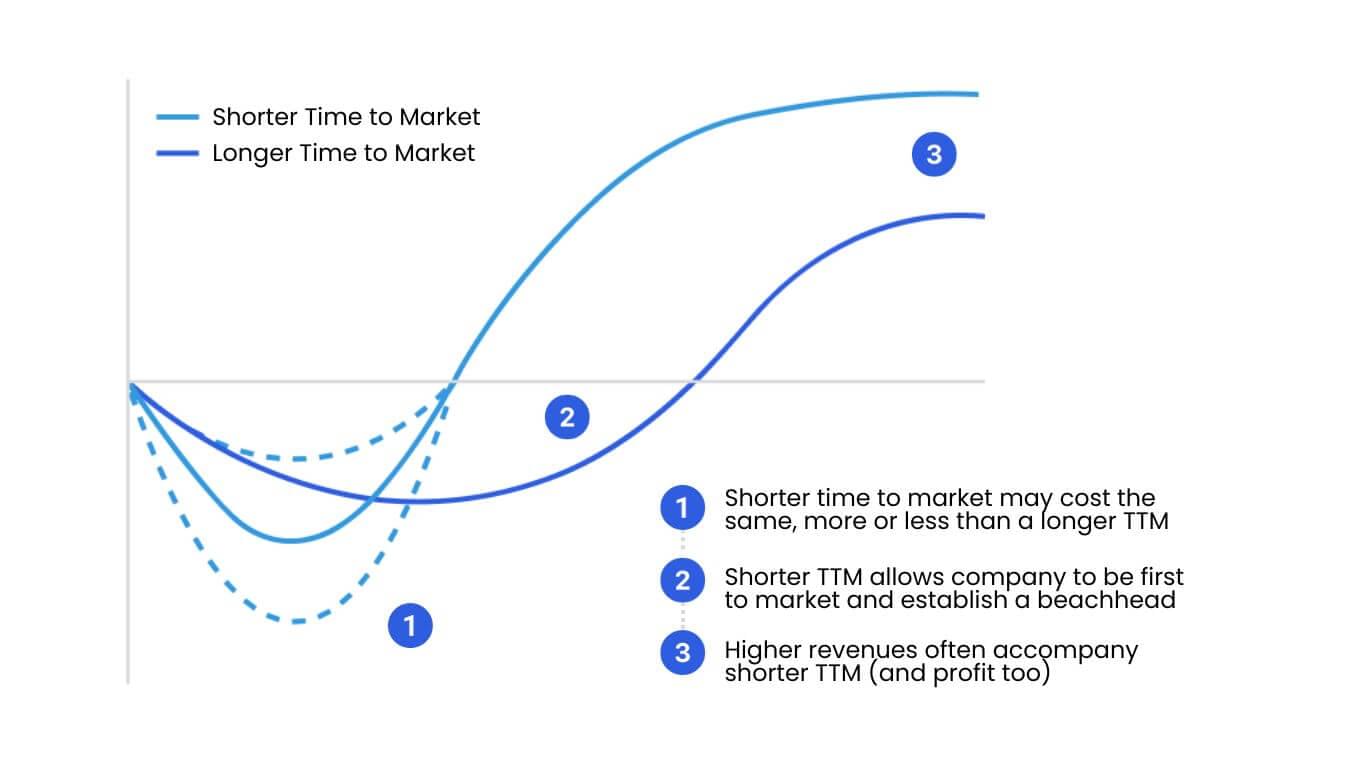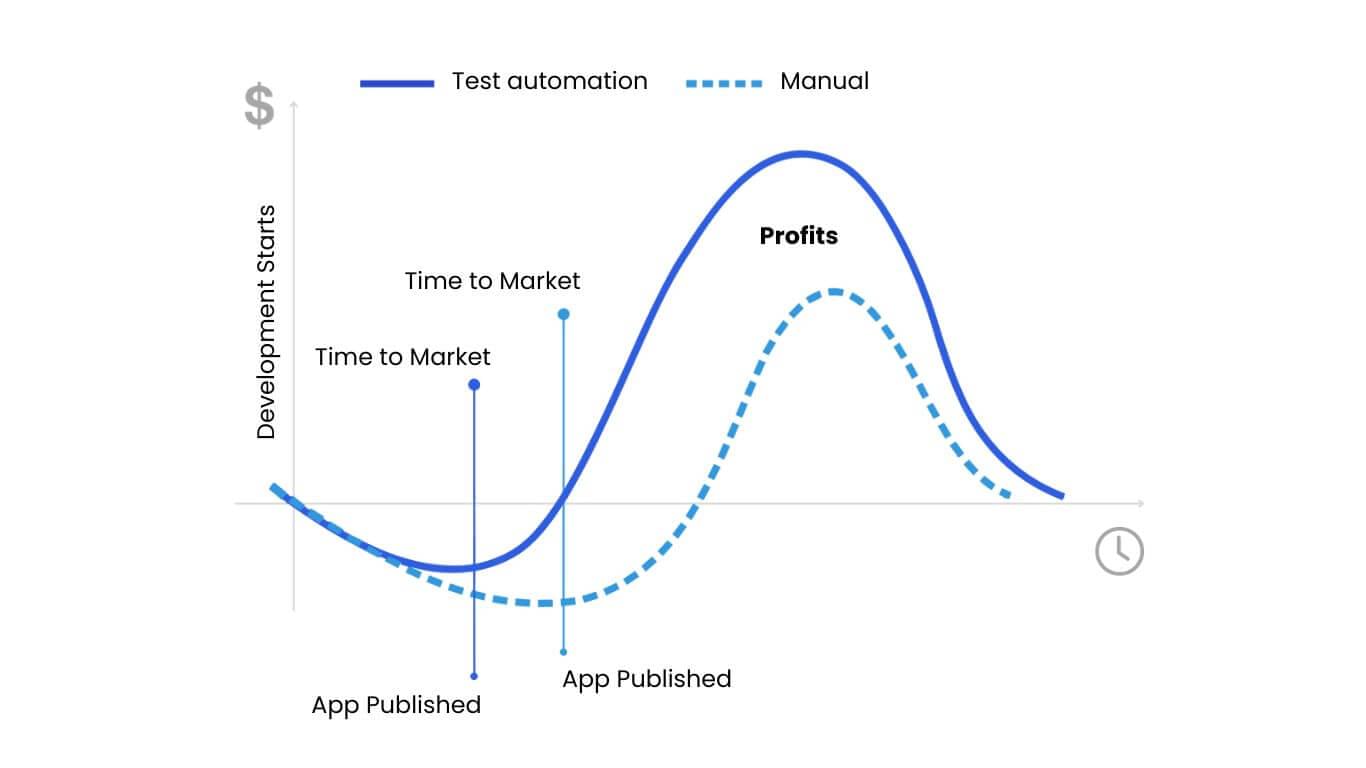How Test Automation Helps Accelerate Time to Market
Start a ProjectToday the vast majority of companies face severe competition in the IT market. To be confident that a software product will be well-accepted by end-users it is needed to hit the market with a solution of sky-high quality. That is indeed important because modern users are very demanding and deeply intolerant of glitches. Hardly can you impress or delight them with a mediocre app. Consequently, a lot of effort should be put not only into software development but also into its comprehensive testing in order to succeed.
Still, there is also the other side of the coin - apart from the necessity to ensure high quality businesses also face the necessity to deliver new products at astronomic velocity. Far too often a fast time to market is critical to fill a gap in the niche before competitors manage to do this. As a result, progressive software development companies are constantly looking for new more efficient ways to accelerate software development.
Currently, automation testing is one of the important factors that contribute to fast time to market. Why is it so? Because this is a fire-sure way to accelerate software testing that as we have already found out an essential part of the software development life cycle. So let’s dig into the topic.
What is Time to Market?
Time to market (also referred to as TTM) is the length of time starting from product ideation to its first release to the market.
Many factors may affect a decision to release at one or another time. However, when it comes to innovative offerings, fast time to market usually matters. Far too often, the success of the business strategy depends on being first to market. So, time to market is one of the most important software development metrics. All in all, to ensure fast time-to-market, it is crucial to identify the right minimum viable product, establish efficient communication with all stakeholders, and properly implement and maximum automate software development and QA processes.
You may ask why there is so much buzz about time to market. Well, numerous studies show that market pioneers usually take advantage of greater market share, higher sales, and substantial revenue. Time is indeed money.
Correlation Between Cost, Revenue, and TTM

According to the above-presented scheme we can make the following conclusions:
A shorter TTM may cost more, less, or the same as a longer TTM;
A shorter TTM gives an opportunity to hit the market first and ensure a strong position there;
A shorter TTM suggests the generation of higher revenues.
Reasons To Shorten Time to Market
In the pursuit to live up to Facebook’s success, many companies adopt today its official motto - ‘Move fast and break things’. This concept lies at the heart of all their processes and they actually focus on speed as the end goal.
Some IT giants like Apple are also driven by customers' insatiable desire for novelty and bring record-breaking products to the market yearly. Their admirers are eagerly waiting for brand-new solutions, and brands regularly deliver them to the market.
Some companies hit the gas because their competitors follow close behind them. Indeed, being under the pressure of severe competition, brands often strive to bump up their development process so that to be first to the market.
Whether fast time-to-market is a part of the corporate culture or the necessity stemmed from a bitter rivalry, it is always associated with business success and economic benefit. So let’s consider in detail the reasons to shorten time-to-market.
Here are some of the most prominent ones:
Testing at the speed of light
Higher Market Share
Higher Revenue
Stellar Reputation
Competitive Advantage
The ability to meet market needs
Easier and faster bug-fixing
The opportunity to save a fortune
Advantages of Test Automation Over Manual Testing
Striving to shorten time to market software development companies may face the dilemma of whether to compromise on product quality but to be first to market or to take time to execute comprehensive software testing and hit the market later but with a high-quality product. The implementation of automated testing can actually help you to release a product early while being completely confident in its great quality. Why does automated testing make a difference? Well, let’s have a look at its advantages over manual testing.
Time-efficiency
Accuracy
Short Feedback Loop
Higher Test Coverage
Test Execution at Any Time
Lower Testing Costs
Get our FREE POC Automation Testing Services to prove our expertise
Get Free POC
How Automation Testing Helps to Shorten Time to Market
Speed is the superpower of automated testing. With its help, you can significantly reduce the time needed for software testing and optimize the development process by making the bug-fixing process easier and faster. As a result, automation testing is one of the key contributors to shortening the time to market.
Correlation Between Cost, Revenue, and TTM

But the question arises of what makes automated testing so fast. In essence, there are a lot of factors that ensure the high speed of automation testing.
Test Reusability
Parallel Test Execution
24/7 Test Execution
Early Testing
Headless Browser Testing
Focus On Critical Tasks
Conclusions about the Business Impact of Automation Testing
Automation testing is deemed to be a boon for the QA and software development industries. This approach has proved its efficiency, speed, and helpfulness. By implementing automation testing, businesses can immensely speed up product delivery while being completely confident in the sky-high quality. In essence, all parties involved are completely satisfied - a product team works without a heavy rush and sleepless nights, business owners yield all benefits related to early product delivery to market, and users enjoy outstanding products and services.
If your manual QA team cannot cope with the scope of work, or you launch a new project and wish to implement automation testing as early as possible, DeviQA is at your disposal. Our experienced automation QA engineers can build an automation testing framework from scratch, design test architecture, write stable and maintainable test scripts, and integrate them into a CI/CD pipeline.
